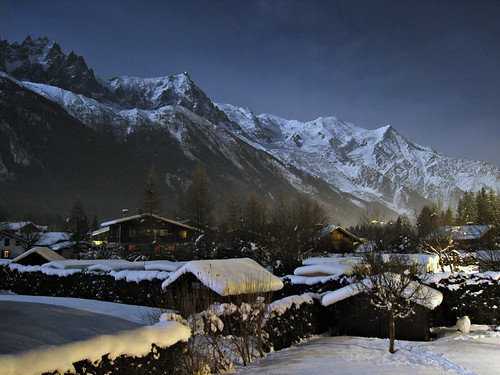
Chamonix, France, hosted the very first Winter Olympic Games ever. This small town in a valley beside Mont Blanc, and a bunch of other mountains, (and I mean a bunch – the valley is surrounded), was “discovered” by modern tourists in 1741 when a pair of Englishmen showed up there and published their account of the incredible glaciers they found. However, they were far from the first people to visit the valley. They weren’t even the first to write about it.
Sometime around the year 1090, a Benedictine convent was founded in the Chamouny valley, and in the documents that granted the land for the convent can be found some clues to the origins of the name of the valley. The words used to describe the valley are campus munitus which translate, roughly, to “fortified field.” Since it was incredibly hard to access the valley at the time, (remember the mountains it’s surrounded by? they’re some of the highest in Europe), it appears that the mountains are the fortification, and the valley is the field. A community, albiet a small one, grew in the valley, so when those two Englishmen arrived in 1741 they met people, not just rivers of ice.
There is a second possibility of the origin of the name Chamonix. Placenames of the World says that the name “derives from a pre-Celtic, possibly Ligurian root, kam, meaning “rounded height.” I think that the fortified field may make more sense, but that’s just my opinion. Anyone is free to send me their arguments for the pre-Celtic root. Maybe we can discover history!
I don’t know exactly the city of Chamonix was founded, (the town created around 1090 was called Le Prieuré), but it seems like a fairly direct line from Chamouny to Chamonix. Maybe it’s even a difference between how a valley should be named and how a city should be named that I’m not aware of.
If you’re interested historical maps, here’s a good one of the area from 1881. Also, the origins of the word Chamonouy were quite difficult to find. It’s on Page 407 of the 1811 edition of A Handbook for travellers in Switzerland and hte Alps of Savoy and Piedmont.


